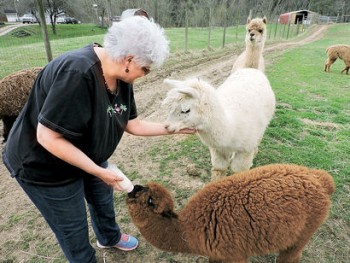
Tammie Marks spends time with the female alpacas in her herd, offering the 7-month-old Bella her bottle while others vie for attention. Bella was abandoned by her mother, and has been bottle fed by the Markses multiple times daily since she was born.
ELIZABETH, W.Va. — People visiting the Point Park Marketplace can hardly miss the old-fashioned spinning wheel set up just inside the front door.
The spinning wheel, and the goods for sale around it, belong to Tammie and Lester Marks, who own and operate the Heavenly Sunlight Alpaca Farm and country store in Wirt County.
Tammie is a Tamarack-qualified artisan, and believed to be one of the only people in the state who turns fiber from her own alpacas into large amounts of hand-created goods to sell, performing the entire animal-to-wares process herself.
The farm where all this happens is located approximately 17 miles past where Interstate 77 crosses Staunton Turnpike, just around the bend from Camp Kootaga Boy Scout Camp in Wirt County, at 17820 Staunton Turnpike.
The alpacas are the first hint that visitors are in the right place, as they are often seen grazing in the fields unless it is raining or extremely hot, said Lester Marks, 70.
The couple decided to go into the alpaca fiber business approximately five years ago, and today own 14 alpacas, said Lester. The six male and eight female alpacas on the Wirt County farm draw attention from curious passers-by.
People commonly stop to investigate the animals grazing by the roadside on the small farm. Daily visitors are a common occurrence in good weather, Lester said.
“People stop and ask ‘What do you do with them? Eat them?'” said Lester.
Far from being meat animals, alpacas are traditionally sought for their fleece, which sells for upwards of $4 an ounce and is often hailed as one of the softest yarn and cloth bases in the world.
With names like Nutmeg, Rose, Priscilla, Sampson, Samuel and Trinity, the alpacas on the Marks’ farm are closer to pets than farm animals. The curious creatures rush to the gate to greet visitors to the farm, and will eat treats out of strangers’ hands.
Making yarn from the alpaca herd is what Tammie Marks, 54, does in her retirement years. Both Tammie and Lester are retired from DuPont, the couple said.
Much like sheep, the fleece of the alpaca needs to be removed once a year for their own health, explained Lester over the humming-grunting sounds of his herd on an early April afternoon.
Traditionally, the shearing happens in the spring, in order to keep this South American creature cool in the heat of summer.
At Heavenly Sunlight Alpaca Farm, shearing usually happens in early May, said Lester. Each adult animal produces five to seven pounds of raw fleece, taken from the area between the base of the neck and the base of the tail, and down toward the belly of the animal. Called the blanket, this area is where the soft, crimped fleece fibers used in making yarn come from, said Lester.
The fleece from the neck, belly and legs is not used in yarn making, although it is sheared off along with the rest of the often three-inch or longer wool that makes up the animal’s coat. Without their fleece, the alpaca is approximately the same size as a white-tail deer, Lester said.
The animals are a part of the camel family, and the smallest member behind camels and llamas. They usually live 15-17 years, although the Marks had one female who lived to be 21 before she passed away last fall.
Alpaca must be kept separated by gender when there is more than one male to prevent bickering amongst the herd, Lester said.
Once the blanket comes off the animal, it must undergo several processes before it can be made into yarn, Tammie Marks said.
The first process is called skirting, wherein the natural fibers, manure, and matted areas are removed from the blanket. What remains is then sent through a nail-covered device known as a picker, which further separates the alpaca wool from the non-wool components, Tammie said.
The wool is then sent through a device called a drum carder, which makes quick work of lining up the fibers so that Tammie can spin them into yarn on her spinning wheel.
The fiber that Tammie spins into yarn is always the natural color that comes off of the alpaca, she said. Each animal’s fleece is kept separate and spun into yarn that consists only of that fleece. Because of this, each alpaca becomes his or her own sub-brand of yarn under the Heavenly Sunlight name, said Tammie.
One strand of yarn spun from alpaca fleece is not very strong and can come apart. Because of this, Tammie makes what is called a three-ply yarn, which means that three strands of yarn are spun together to form a strong, solid yarn that will not break easily.
Tammie then takes the finished yarn and knits, crochets, or weaves it into various items which she and Lester sell at Point Park Marketplace, at the Heavenly Sunlight store on their Wirt County farm, and at various crafting fairs around the area.
The farm processes approximately 15 percent of its fiber in this manner. The rest is sent off to fiber mills in Pennsylvania, which can often take up to three months to turn the raw fleece blanket into a loose rope of aligned fibers known as roving, which is then spun into yarn by Tammie.
Tammie’s wares include hats, which sell for $20-25; scarves for $40-60; hooded scarves for $60; gloves for $16; and shawls for $180-195. They are available at Point Park Marketplace from Wednesday through Saturday from 10 a.m. to 6 p.m., with Fridays open until 7 p.m., Tammie said. Sunday hours are 10 a.m. to 5 p.m.
At the Wirt County farm, store hours are 10 a.m. to 4 p.m. Thursday through Saturday. The couple can also be found at their booth at the Black Walnut Festival in Spencer, W.Va., the West Virginia Arts and Crafts Fair in Ripley, W.Va., the Buckwheat Festival in Kingwood, W.Va., the Jackson Jubilee in Jackson, W.Va., and the Milton Pumpkin Festival in Milton, said Tammie.
To read more from the Parkersburg News and Sentinel, subscribe here.




